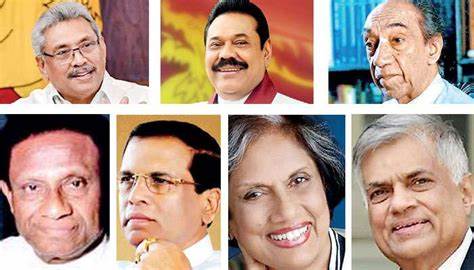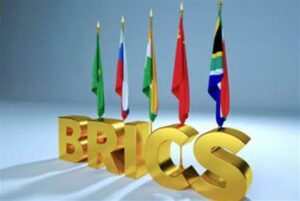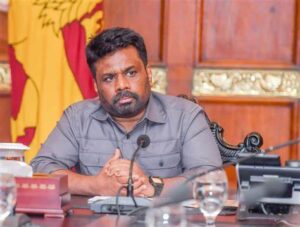
Wide Angle on Previous Governance Failures to Transformative Reform
- CNL Reporter
- December 1, 2024
- Weekly Political Review
- Wide Angle on Previous Governance Failures to Transformative Reform
- 0 Comments
Weekly Political Review
Path to Accountability, Socio-Economic Rights, and International Diplomacy
By Rohana Jith
Sri Lanka’s political landscape has entered a new chapter with the ascension of President Anura Kumara Dissanayake (AKD) and his government, marking the culmination of the Aragalaya movement-a powerful uprising against corruption, inefficiency, and systemic failure.
The movement embodied the public desire for transformative change and rejected an entrenched governance structure that had clearly failed its citizens. But converting that aspiration into tangible outcomes remains the critical challenge facing the AKD administration.

The Legacy of a Flawed Governance System
The governance structure of Sri Lanka, with the preeminent position accorded to the executive without a system for accountability, fundamentally undermines democratic principles despite peaceful elections being conducted.
This systemic flaw is deeply embedded in the country’s constitutional framework, which nominally ensures civil and political rights but offers limited enforcement mechanisms. Successive governments have exploited this system, operating above the law and disregarding public expectations.
The vision for reform and development, during his inaugural address to the 10th Parliament, came from President Dissanayake. Yet noticeably, he avoided discussing two of the most major areas: the question of the Executive Presidency and foreign policy for his administration.
The Executive Presidency, a widely criticized feature of Sri Lanka’s political system, was hardly discussed in the election campaign amidst other major concerns of corruption and mismanagement of the economy.
But while this was mentioned in the manifesto of the ruling coalition, the President refrained from discussing it. This led to suspicion regarding the will of the government for reforms.
Similarly, the Presidential address did not have clarity regarding Sri Lanka’s diplomatic policy either. Being a small country in a globalized, multipolar world, there is much that Sri Lanka faces: economic stabilization, restructuring debts, and making use of its strategic maritime position.
The President’s call to upgrade trade offices to promote local exporters was not enough to articulate a clear foreign policy plan.
Bridging Domestic Priorities and Global Engagement
Sri Lanka’s recent bid to join BRICS signals an intent to strengthen ties with the Global South. However, it is at such platforms that a country needs to show value through proactive engagement and effective diplomacy.

For example, Sri Lanka not attending the COP-29 climate summit on financing for climate projects in developing nations was a missed opportunity for it to emerge as a consensus builder on global matters.
The UN Resident Coordinator in Sri Lanka has made a call for active involvement in international climate discussions.
While this will help Sri Lanka build greater international prestige, it could also unlock resources to respond to pressing national climate issues highlighted by recent devastating floods.
Charting a Roadmap for Transformative Change
The AKD administration has to adopt a comprehensive, strategic roadmap that integrates civil, political, and socio-economic rights in its quest to break loose from the governance pitfalls of the past. This calls for a shift from rhetorical commitments to the creation of enforceable frameworks that guarantee the realization of these rights.

1. Institutionalizing Socio-Economic Rights
The government should spearhead a multi-disciplinary process of entrenching socio-economic rights into the legal and constitutional framework, thus making them justiciable through the courts.
The conference would bring together scholars, policy analysts, and representatives from civil society to produce concrete, actionable proposals for structural reforms.
Evidence-based solutions should cover funding, monitoring, and evaluation mechanisms of socio-economic programs, encouraging public debate and consensus building for such reforms.
2. Establish Quantifiable Targets
The AKD government should further flesh out these lofty ambitions into concrete, actionable targets regarding income inequality, healthcare, and education access. Setting clear timelines with specific milestones will enhance the level of accountability, therefore enabling citizens to track performance of the government and reinforcing public trust in its commitment to transforming change.
3. Empowerment through Better Governance and Accountability
Systemic reforms are needed that would prevent executive overreach and ensure judicial independence. Constitutional amendments should be clear about the separation of powers; anti-corruption bodies and human rights commissions should, in turn, be empowered to hold officials accountable. Protection of civil and socio-economic rights within a strong legal framework would be the institutional support necessary for meaningful reform.
4. Promoting Transparency and Citizen Engagement
Public participation lies at the very heart of good governance. Ways are needed to increase access to information, transparency in decision-making, and the passage of freedom of information laws to hold public officials accountable. Active engagement with marginalized communities will foster inclusivity and amplify their voices in policy discussions.
5. Building Capacity for Sustained Reform
The entrenchment of socio-economic rights into laws is only the first step; the government must build the institutional capacity to realize and maintain these rights. This calls for governance structures that are aligned with a transformative vision in which the integration of these rights is part of the everyday lives of citizens, including remedies in case of infringements, and a culture of accountability.
Balancing Domestic and International Objectives
Furthermore, the AKD administration has to reconcile its domestic agenda with the cold realities of international diplomacy. The economic challenges that face Sri Lanka—debt restructuring and dependence on IMF reviews—are delicate matters for a country that is heavily interlinked with relationships between big powers like India, China, and the United States. How far the government can balance such relations without compromising its national interests is a test for which foreign policy will define its shape and direction.
Further, resolving issues of rule of law, accountability, and human rights within the country will have their impact on Sri Lanka’s international standing. Showing progress in these areas is important for gaining diplomatic support and making sure the country is in line with global expectations.

Conclusion: A Path to Meaningful Change
The AKD government represents a turning point in the history of Sri Lanka: an opportunity to be liberated from corruption and mismanagement that has spanned decades. Realizing such a vision requires an AKD that will provide clear, actionable steps to tackle the systemic flaws, emphasize socio-economic rights, and connect domestic objectives with global realities.
By embracing transparency, accountability, and public participation, the AKD administration can rebuild trust and lay the foundation for sustained progress. Balancing these reforms with a proactive foreign policy will position Sri Lanka as a responsible and influential player on the global stage. The success of this transformative agenda will finally determine whether Sri Lanka can fulfill the promise of the Aragalaya movement and achieve meaningful change for its citizens.

